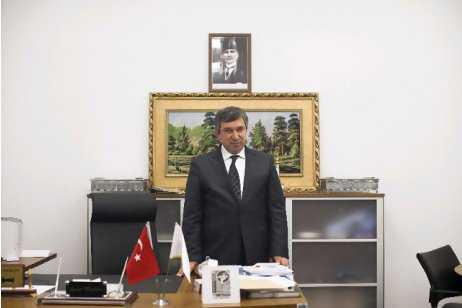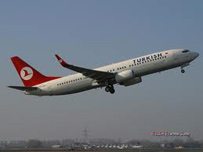ERBIL // At the first branch of the Turkish VakifBank in Iraq, the manager sits proudly in his office under a portrait of Mustafa Kemal Ataturk, the founder of modern Turkey.
But while Ataturk coveted the oil-rich territory of northern Iraq when he founded Turkey, the banker Yesur Meylani has not come to occupy land. In fact, he is a Kurd – one of more than 21,000 Turks who have moved to Erbil, many in the hope of tapping into the booming cross-border trade.

Masrour Barzani, grandson of the man seen as the founder of the Kurdish national movement, says he wants to change ‘the mentality of people whom we live with to accept the Kurds as equals.’ Read article
With a long history of tension with Kurds in Turkey and a volatile Iraqi border, Turkey might not seem like the ideal business partner for the semi-autonomous Kurdistan region. But against all odds, the relationship is growing.
“The politics and the economics are feeding each other,” Mr Meylani said.
VakifBank, which has about 650 branches in Turkey, opened in Erbil in February “because of the good relations between Turkey and Kurdistan and also because of the volume of trade”, he said.
Turkey’s export volume to Iraq was US$7.5 billion (Dh27.5bn) in 2010, about 70 per cent of which was focused on Iraqi Kurdistan. Much of the trade is carried on trucks that squeeze through the only official border crossing between the two countries at Ibrahim Khalil – around 1,500 in each direction every day.
Aydin Selcen, the consul general at the Turkish consulate in Erbil, said: “The business volume that we have with this region, the Iraqi Kurdistan region, is equal to what we have for Syria, Lebanon, Jordan combined.” said When the consulate opened at one of Erbil’s new office blocks in March 2010, it became Turkey’s third consulate in Iraq.
Iraqi Kurdistan has 16 Turkish schools and two Turkish hospitals, and more than half of the foreign companies registered in the region – 741 in total – are from Turkey, Mr Selcen said. He said trade is “going to increase drastically” as Ankara pushes to reach its target of $25bn of trade annually with Iraq.
One of the main drivers of the economic relationship is Turkey’s thirst for energy to fuel its expanding economy, alongside its desire to diversify suppliers – Russia now provides about 70 per cent of the country’s natural gas.
“What they produce now in natural gas can satisfy one quarter of what we need. So if you add the undiscovered oil and gas resources to already existing ones, it’s for sure an interesting destination for our companies,” Mr Selcen said.
But while cross-border business is flourishing, the Kurdish militants known as the Kurdistan Workers’ Party, or the PKK, continue to damage relations. The group, which is designated as a terrorist organisation by several states including the US, has a stronghold in Iraq’s remote northern mountains. The guerrillas use the base to launch attacks on Turkey, and the Turks have bombed the rugged terrain, targeting the PKK.
Mr Selcen said counter-terrorism is one of the most important issues of co-operation between the two countries. He said there has been progress, “but this is such a sensitive issue that, of course, we are asking for more”.
Masrour Barzani, the chief of the Kurdistan Region Security Protection Agency, said the PKK operates in “harsh terrain” near the borders of Iraq, Iran and Turkey: “It’s difficult for Turkey to control it. It’s difficult for Iran to control it and it’s definitely difficult for us to control it.”
“We’ve been telling the Turks that we don’t think military solutions are the best solutions. We believe that peaceful solutions are going to last and that’s what we support and I think they understand that now.”
Mr Barzani said: “Trade and economic relations is helping the relationship, because before that there was more tension between the Kurdistan region and Turkey, with the Turks and the Kurds in general.”
Ako Shwani, a history professor at the University of Sulaymaniyah, said the Turks have a history of oppressing the Kurds, but they are changing tack to improve their human rights record in a bid to join the European Union.
Iraq has about 4.5 million to 6 million Kurds; Turkey has 14 million, according to the CIA World Factbook. Mr Shwani said the Turkish government fears that Iraqi Kurdistan’s success could inspire Turkish Kurds to push for independence.
“We have a parliament and a government, and the region’s greater degree of autonomy is not good in the Turkish mind,” he said.
Locals suspect that Turkey is sending its secret police into Iraqi Kurdistan to gather information, he said. “We don’t hate the Turkish people, we hate the Turkish regime.”
In the Souk al Kabeer, or the big market, at the foot of Erbil’s hulking citadel, merchants are taking advantage of the security in the region. The winding corridors teem with shops selling fabrics, perfumes and food; street hawkers polish shoes and sell pirated DVDs with titles such as The Fall of Baghdad.
“We’re happy to trade with Turkey,” said a Turkmen shop owner who gave his name as Mohammed. “Ten years ago, there were only locals here, but now there are people from everywhere and there’s very little poverty.”
Yousef Yaseen, a Kurdish graduate of Erbil University whose family owns five gold shops in the souk, agreed that locals are pleased to see Turks settling in the city.
Some of the Kurds do not support the PKK “troublemakers”, he said. “There are a lot of Turkish companies here. It’s a good thing.”
via Full: Open for business: Turkey’s bankers tap into Kurdish boom – The National.

